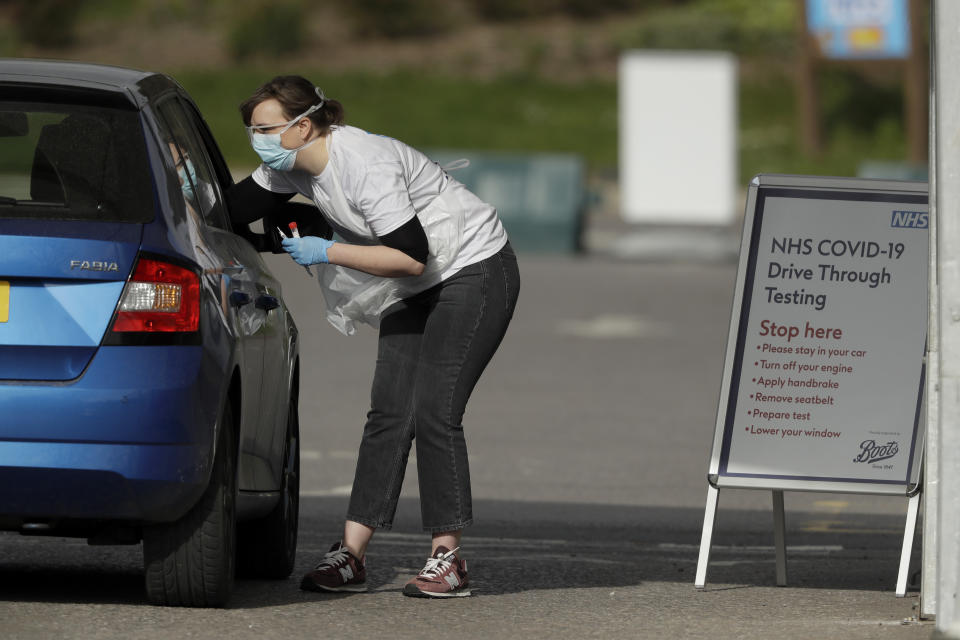Coronavirus: UK will see hundreds of deaths every day for some time despite passing peak, expert warns

Hundreds of deaths will continue to be reported every day as the UK declines from the peak of its initial coronavirus outbreak, an expert has warned as the toll rose today to 14,576 people.
The University of Oxford’s professor James Naismith, director of the Rosalind Franklin Institute, said the decline will only be gradual and social distancing must continue to prevent more deaths.
He said three conclusions could be made from today’s increase of 847 deaths.
“Firstly, the UK is one of the hardest hit countries in the world from this first wave.
“Secondly, the UK seems to have passed the peak for the first wave. Finally, we will likely see only a gradual decrease from the peak and this means we will see several hundreds of announced deaths every day for some time ahead.
“Each one of which will have brought misery to families.”
Latest coronavirus news, updates and advice
Live: Follow all the latest updates from the UK and around the world
Fact-checker: The number of COVID-19 cases in your local area
6 charts and maps that explain how COVID-19 is spreading
He added that a “significant number” of deaths needed to be added to the totals to account for those that happen outside of hospitals.
“If we do not continue to socially distance, there will be many more deaths. It seems highly likely that we and the world will face further waves of the virus until a vaccine is in use.
“Facing these future threats requires public support and total honesty about the trade offs that will be involved in government decisions. I think everyone now realises just how fast this pandemic can move and what the stakes are."
It comes a day after the UK’s lockdown was extended for a further three weeks amid warnings that easing up too early could result in a second outbreak.
There are also 108,692 confirmed cases, up 5,599 from the amount published by the Department of Health yesterday.
The case numbers are accurate to 9am today and the death toll is correct as of 5pm on 16 April.
The rise is not as high at the daily tolls recorded between 8 April and 11 April, three of which were over 900, but it is the first time since 11 April that the toll exceeded 800.
Focus is now on whether the trend in deaths and cases continues to decline in the long term, which would indicate the outbreak is passing its peak.
The government has announced on Thursday that the lockdown restrictions will remain in place for at least another three weeks.
The measures, which limit the reasons people can leave their home to exercise and essential trips, have slowed the virus’s spread and stopped the NHS being overwhelmed with new cases but Dominic Raab, deputising for Boris Johnson, said it was too soon to ease up.
The government believes that lifting restrictions too early would result in a second outbreak.
“The very clear advice we received is that any change to our social distancing measures now would risk a significant increase in the spread of the virus,” Raab said.
“That would threaten a second peak of the virus and substantially increase the number of deaths.
“It would undo the progress we have made to date and as a result would require an even longer period of the more restrictive social distancing measures.”
The government will look at how it can make changes to restrictions based on five conditions, he said.
He outlined those as ensuring the NHS can cope with demand, a sustained fall in daily death rates, rate of infection decreasing to manageable levels, ensuring testing capacity and personal protective equipment is available for future demand and being confident any action would not result in a second peak.

There are also problems with infections in hospitals and care homes, and Raab added: “The Prime Minister said at the outset that it would take three months to come through the peak and I think that, broadly, is still the outline.
“We can’t give a definitive timeframe, that would be to prejudge the evidence, that wouldn’t be a responsible thing to do.
“But our message to the British public is: there is light at the end of tunnel, we are making progress, but at the same time we must keep up the social distancing measures.”
Health secretary Matt Hancock has said the government needs a “comprehensive test,, track and trace” system in place “as soon as possible”.
His comments came as MPs questioned him in a virtual health select committee today.
Chairman Jeremy Hunt – the former health secretary – referred to World Health Organization guidance that countries need to “detect, test, isolate and treat” to lift lockdowns.
“We do need to have comprehensive test, track and trace in place as soon as possible,” Hancock said.
“And we need to get the technology right, we need to have the people and we’re building that resource and obviously we need to have the testing and we’re ramping that up as well.
“So we do need to have all three of those in place and we’re working incredibly hard to make sure that we are.”

 Yahoo News
Yahoo News 
